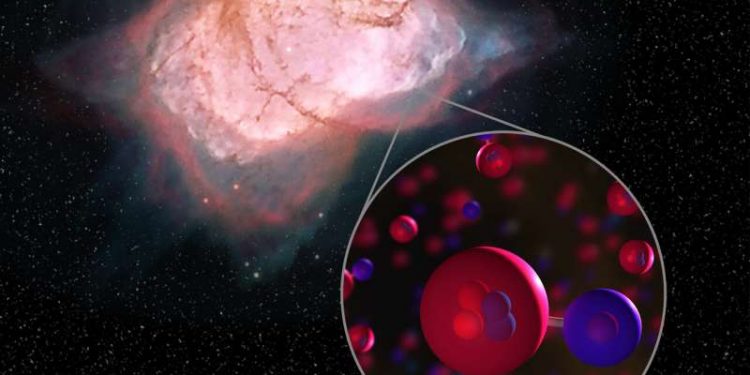Berlin, April 18: Scientists have detected the most ancient type of molecule in our universe in space for the first time ever.
Helium hydride ion (HeH+) was the first molecule that formed when, almost 14 billion years ago, falling temperatures in the young universe allowed recombination of the light elements produced in the Big Bang.
At that time, ionised hydrogen and neutral helium atoms reacted to form HeH+, said researchers from The Max Planck Institute for Radio Astronomy (MPIfR) in Germany. Despite its importance in the history of the early Universe, HeH+ has so far escaped detection in astrophysical nebulae — cloud of gas and dust in outer space.
Operating the GREAT far-infrared spectrometer onboard the flying observatory SOFIA, an international team reported unambiguous detection of the molecule towards the planetary nebula NGC 7027. During the dawn of chemistry when the temperature in the young universe had fallen below 4000 Kelvin, the ions of the light elements (hydrogen, helium, deuterium and traces of lithium) produced in Big Bang nucleosynthesis recombined in reverse order of their ionisation potential.
Helium combined first with free electrons to form the first ever neutral atom, according to the study published in the journal Nature. At that time hydrogen was still ionised or present in form of bare protons.
Helium atoms combined with these protons into the helium hydride ion HeH+, the universe’s first molecular bond. As recombination progressed, HeH+ reacted with then neutral hydrogen and created a first path to the formation of molecular hydrogen — marking the beginning of the modern universe.
Despite its unquestioned importance in the history of the early Universe, the HeH+ molecule has so far escaped detection in interstellar space, researchers said. Studied in the laboratory as long ago as 1925, dedicated searches during the last decades have been unsuccessful, thereby challenging our understanding of the underlying chemical networks, they said.
“The chemistry of the universe began with HeH+. The lack of definitive evidence of its very existence in interstellar space has been a dilemma for astronomy for a long time,” said Rolf Gusten from the MPIfR.
In the late 1970s, astro-chemical models suggested the possibility that HeH+ might exist at detectable abundances in local astrophysical nebulae, and would be most easily observed in so-called planetary nebula, ejected by Sun-like stars in the last stage of their lifetime.
The hard radiation field produced by the central white dwarf star with a temperature of more than 100,000 degrees drives ionisation fronts into the ejected envelope, where HeH+ is predicted to form.
The molecule will emit its strongest spectral line at a characteristic wavelength of 0.149 mm.
However, Earth’s atmosphere is opaque at this wavelength for ground-based observatories, requiring this search to be performed from space or a high-flying observatory like SOFIA cruising above the absorbing layers of the lower atmosphere.
“With recent advancements in terahertz technologies it has now become possible to perform high-resolution spectroscopy at the required far-infrared wavelength,” said Gusten.
Operating the GREAT spectrometer aboard SOFIA the team now reports the unequivocal detection of HeH+ towards the envelope of the planetary nebula NGC 7027. “The discovery of HeH+ is a dramatic and beautiful demonstration of nature’s tendency to form molecules,” said David Neufeld from the Johns Hopkins University in the US.
“Despite the unpromising ingredients that are available, a mixture of hydrogen with the unreactive noble gas helium, and a harsh environment at thousands of degrees Celsius, a fragile molecule forms,” Neufeld said.
“Remarkably, this phenomenon can not only be observed by astronomers but also understood using theoretical models that we have developed,” he said.
The detection of this special molecule brings a long search to a happy ending, and eliminates doubts that we might not understand the underlying formation and destruction as well as we thought, researchers said.






































